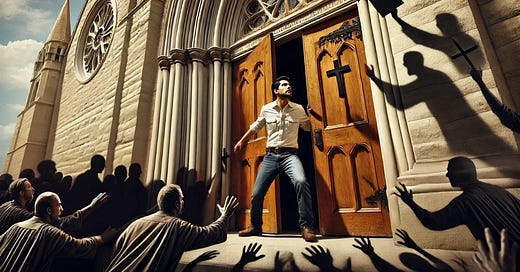From Sodom to Christo-Fascism: How the Bible’s Warning About Power Still Speaks Today
Resisting the Spirit of Domination and Death, Part 2
This Series, I’ll release all my Friday Deep Dives for free until 9:00 pm (CST) the following Sunday. So, if you want to read them for free, you can do so for a limited time.
It was the fall of 1999. I had entered into seminary. First round of courses. I was excited.
I was also in a more conservative seminary, and therefore a bit of a black sheep.
It was a beautiful day and I stood outside the apartments with a fellow seminarian having a conversation about the most contentious topic of the day: the ordination of gays and lesbians in the Presbyterian Churc (USA).
In the midst of the conversation, he said, “Homosexuality is the sin of Sodom and Gomorrah, and God destroyed both cities for it.”
I replied, “But, homosexuality isn't the sin of Sodom and Gomorrah. If we allow ‘Scripture to interpret Scripture’ we can look at other passages in the Bible to find out what the sin of Sodom and Gomorrah was. And when we look at the book of Ezekiel, we see that it was clearly arrogance and neglecting the poor.”
To this replied, “I've never actually read the whole Bible.”
My brain slammed on the brakes and the airbags went off inside my skull.
I admit I didn't know how to respond to that. That was when I discovered many seminary students hadn't read the Bible before entering seminary. I had no idea that was a thing.
You see, before I had become the raging liberal, I was going through a fundamentalist phase. During that time, the Bible was everything. I not only read it, but I tried to memorize as much as possible.
Then, as the raging liberal, I did a lot of research into the passages that dealt with homosexuality because it was such an important issue.
All this before I got to seminary. Maybe you can imagine my surprise.
So, for those who haven’t done the research into this topic, let's take a moment to look at the “sin of Sodom” from a biblical perspective, rather than assuming the perspective of Evangelical subculture. I think probing a little deeper into the texts might lead to an ironic—and painful for many—surprise in the end.
“Scripture interprets Scripture”
If you've never heard this phrase, it's used a lot in reformed theological circles. The idea is that different parts of scripture can give you insights on how to interpret other parts of scripture.
Now, this interpretive method has been abused a lot, and we want to be very careful with it. The popular assumption for conservatives is that scripture is univocal, which is to say that it is always aligned with itself. But, from the perspective of academic biblical scholarship, this is obviously not the case.
That said, it is important to look at different texts to see how they understood other key texts, because all of those texts—even if they have different opinions—are part of the tradition.
And more significantly for us, those who oppose homosexual marriages or unions typically interpret scripture out of the assumption of univocality. If one accepts that univocality, then what I have to say is exceptionally significant.
Scriptural context
Before we look at the passage about Sodom and Gomorrah, I think it's important to first look at how other parts of scripture understand what went wrong in Sodom and Gomorrah to bring about God's wrath.
Once we've established a framework for understanding the Sodom and Gomorrah passage, then we can actually look at the passage through a different lens, one that is more biblical than than it is cultural.
Keep reading with a 7-day free trial
Subscribe to Religious, Reasonable, & Radical to keep reading this post and get 7 days of free access to the full post archives.




